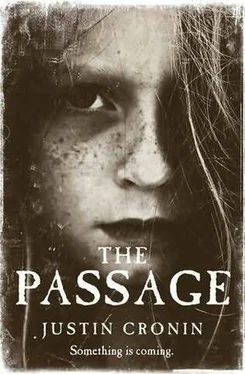“Careful there,” a man behind them warned. “They may look cute, but to them you’re just lunch, little girl.”
Startled, Lacey turned her head, searching for the source of the voice. Who was this man, to try to scare a child like that? But none of the faces behind her returned her look; everyone was smiling and watching the bears.
“Amy,” she said softly, and put her hand on the girl’s shoulder. “Perhaps it’s best not to tease them.”
Amy seemed not to hear her. She leaned her face closer to the glass. “What’s your name?” she asked the bear.
“There now, Amy,” Lacey said. “Not so close.”
Amy stroked the glass. “He has a bear name. It’s something I can’t pronounce.”
Lacey hesitated. Was it a game? “The bear has a name?”
The girl looked up, squinting. A knowing light was in her face. “Of course he does.”
“He told you this.”
The pool erupted with a tremendous splash. The crowd drew a sharp intake of breath. A second bear had leapt into the water. He-she?-paddled through the blue toward Amy. So now there were two, bumping the glass just inches from her face, their bodies big as automobiles, their white fur rippling in the underwater currents.
“Will you look at that,” someone said. It was the woman Lacey had seen at the kiosk. She was standing beside them, holding her infant up to the glass by the armpits, like a doll. The woman, whose long hair was stretched away from her face by a tight ponytail, was wearing shorts and a T-shirt and flip-flops. Lacey could discern, through the folds of her shirt, the still-loose belly of her pregnancy. The husband was behind them, guarding the empty stroller and holding the camera.
“I think they like you,” the woman said to Amy. “Look, sweetie,” she sang, and jiggled the infant, making her arms flap like a bird’s. “See the bears. See the bears, sweetie. Honey, take the picture. Take… the… picture.”
“I can’t,” said the man. “You’re not looking the right way. Turn her around.”
The woman sighed irritably. “Come on, just take it while she’s smiling, is that so hard?”
Lacey was watching this when it happened: a second splash, and then, before she could turn her head, a third. She felt the glass bulge beside her. A ridge of water crested the lip and began to fall, everyone aware of what was happening but powerless to act.
“Look out!”
The icy water hit Lacey like a slap, filling her nose and mouth and eyes with the taste of salt, hurling her back from the glass. A chorus of screams erupted all around. She heard the baby’s cry, and then the mother yelling, Get away, get away! Bodies banged against her; Lacey realized she’d closed her eyes, against the stinging salt. She tumbled backward, her feet catching and tripping, and fell onto a pile of people. She waited for the sound of the glass breaking, the slam of the tank’s unleashed water.
“Amy!”
She opened her eyes to find a man looking at her, his face inches from her own. It was the man with the camera. Around her the crowd had fallen silent. The glass had held after all.
“Sorry,” the man said. “Are you all right, Sister? I must have tripped.”
“Goddamnit!” The woman was standing over them, her clothing and hair soaked through. The baby was screaming against her shoulder. Her face was furious. “What did your kid do?”
Lacey realized she was talking to her .
“I’m sorry-” she began. “I don’t-”
“Look at her!”
The crowds had backed away from the tank, all eyes locked on the little girl with the backpack who was kneeling before it, her hands on the glass, and the four bear faces crowded against it.
Lacey climbed to her feet and moved quickly. The little girl’s head was bowed, water still raining from her drenched hair onto her knees. Lacey saw that her lips were moving, as if in prayer.
“Amy, what is it?”
“That girl’s talking to the bears!” a voice cried, and a buzz of wonder went up from the crowd. “Look at that!”
Cameras began to click. Lacey crouched beside Amy. With her fingers she pulled the dark strands of the girl’s hair away from her face. Her cheeks were streaked with tears, mixed in with all the water from the tank.
“Tell me, child.”
“They know,” Amy said, her hands still pressed to the glass.
“What do the bears know?”
The girl raised her face. Lacey was stunned; never had she seen such sadness in a child’s expression, such knowing grief. And yet, as she searched Amy’s eyes, she saw no fear. Whatever Amy had learned, she had accepted it.
“What I am,” she said.
***
Sister Arnette, sitting in the kitchen of the Convent of the Sisters of Mercy, had decided to do something.
It was 9:00, it was 9:30, it was 10:00; Lacey and the girl, Amy, had not returned from wherever they had gone. Eventually Sister Claire had surrendered the story: that Lacey had skipped Mass, and that the two of them had left shortly thereafter, the girl with her backpack; Claire had heard them leave and then watched from the window as they made their way through the back gate, to the park.
Lacey was up to something. Arnette should have known.
The story about the girl didn’t wash, she’d known that right away; or, if not known exactly, then certainly she had felt it, a kernel of suspicion that had grown overnight into the certainty that something was not right. Like Miss Clavel, in the Madeline books, Sister Arnette knew .
And now, just like in the story: one of the little girls was gone.
None of the other sisters knew the truth about Lacey. Even Arnette hadn’t learned the full story until the office of the superior general had forwarded the psychiatric report. Arnette remembered hearing something about it on the news, all those years ago, but wasn’t something like that always happening somewhere, especially in Africa? Those awful little countries where life seemed to mean nothing, where His will was the strangest and most unknowable of all? It was heartbreaking, horrifying, but the mind could take in only so much, so many stories of this kind, and Arnette had forgotten all about it; and now here was Lacey, under her care, no one else knowing the truth; Lacey, who, she had to admit, was in nearly every way a model sister, if a little self-contained, perhaps a little too mystical in her devotions. Lacey said, and no doubt believed, too, that her father and mother and sisters were still in Sierra Leone, going to palace balls and riding their polo ponies; since the day she’d been found hiding in a field by the U.N. peacekeepers who had turned her over to the sisters, Lacey had never said otherwise. It was a mercy, of course; it was God’s own mercy, protecting Lacey from the memory of what had happened. Because after the soldiers had killed her family, they hadn’t simply gone away; they’d stayed with Lacey in the field, for hours and hours, and the little girl they’d left for dead might just as well have been dead, if God hadn’t protected her by washing her mind of these events. That He had chosen not to take her at that instant was simply an expression of His will, and nothing for Arnette to question. It was a burden, this knowledge, and the worry that came with it, for Arnette to bear in silence.
But now there was the girl. This Amy. Polite to a fault, quiet as a ghost, but wasn’t there something rather obviously wrong with the whole situation? Something completely unbelievable? Now that she thought about it, Lacey’s explanation made less than no sense. She was friends with her mother? Impossible. Except for daily Mass, Lacey barely set foot outside the house; how she would have come into contact with such a woman, let alone a woman who would trust her with her daughter, Arnette could not explain. Because there was no explanation; the story was a lie. And now the two of them were gone.
Читать дальше












